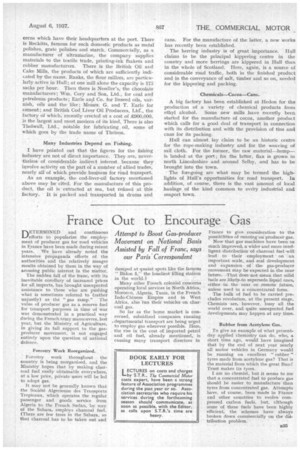France Out to Encourage Gas
Page 41

If you've noticed an error in this article please click here to report it so we can fix it.
Attempt to Boost Gas-producer Movement on National Basis Assisted by Fall of Franc, says our Paris Correspondent
DETERMINED and continuous L./efforts to popularize the employment of producer gas for road vehicles in Erance have been made during recent years. We have already noted the intensive propaganda efforts of the authorities and the relatively meagre results obtained by them in the way of arousing public interest in the matter.
The sudden fall of the franc, with its inevitable corollary of increased prices for all imports, has brought unexpected assistance to those who are pushing what is sometimes referred to (rather unjustly) as the " gas ramp." The value of producer gas as a reserve fuel for transport purposes in time of war was demonstrated in a practical way during the French army manceuvres, last year, but the Ministry of Agriculture, in giving its full support to the gasproducer movement, is not engaged entirely upon the question of national defence.
Forestry Work Reorganized.
Forestry work throughout the country is being reorganized, and the Ministry hopes that by making charcoal fuel easily obtainable everywhere, at a low price, private users will be led to adopt gas.
It may not be generally known that the Societe Algerienrie des Transports Tropicaux, which operates the regular passenger and goods service from Algeria to the French Sudan, by way of the Sahara, employs charcoal fuel. (There are few trees in the Sahara, so that charcoal has to be taken out and dumped at quaint spots like the famous " Bidon 5," the loneliest filling station in the wod.d.) .
Many other French colonial concerns operating local services in North Africa, Morocco, Algeria, Tunis, in the French Indo-Chinese Empire and in West Africa, also -run their vehicles on charcoal gas.
So far as the home market is concerned, subsidized companies running -departmental tiansport are being urged to employ gas wherever possible. Here, the rise in the cost of imported petrol and oil fuel, already mentioned, is causing many transport directors in France to give consideration to the possibilities of running on producer gas.
Now that gas machines have been so much improved, a wider and more intelligent distribution Of, charcoal fuel will lead, to their employment on an important scale, and real development and expansion of the gas-producer movement May be expected in the near future, That does'not-mean that solid fuels are likely-to supersede liquid ones, either in the near or remote future, unless used in a concentrated form.
The bulk of fuel to be carried preeludes revolution, at the present stage. Chemists are, however, busy all the world over, and quite unexpected fuel developments may happen at any time.
Rubber from Acetylene Gas.
To give an example of what presentday applied chemistry can do, who, a short time ago, would have imagined that by the end of next year nearly all motor vehicles in Germany would be running on excellent " rubber " tyres made from acetylene gas? That is the material from which the great Bund Trust makes its tyres.
• I am no chemist, but it seems to me that a concentrated fuel to produce gas should be easier to manufacture than tyres from concentrated gas. Attempts have, of course, been made in France and other countries to evolve compressed carbon fuels, but, although some of these fuels have been highly efficient, the schemes have always broken down commercially on the distribution problem.' •












































































